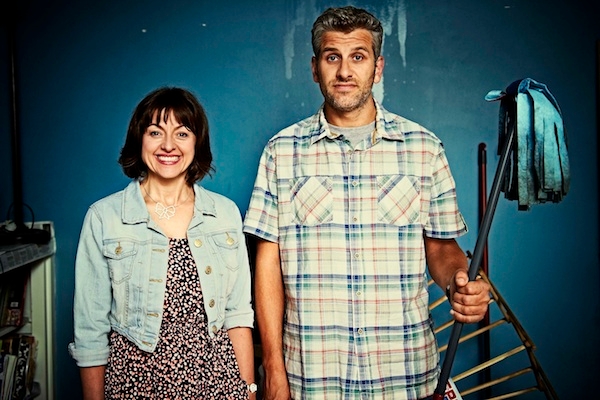What would you do if you had a quite extraordinary talent in impersonating everyone, from Al Pacino to Barack Obama to just any random Irish bloke? In TV land, you are probably rather baffled by it all, and unsure what to do about it as you languish in an unfulfilling half-life, until a Series of Events comes along to show you what a gift you have.
This is what happens to The Mimic’s Martin Hurdle, whom we first encounter in his car stuck in traffic, entertaining himself by putting on the voice of Terry Wogan, true to it in texture and timbre, if not in spirit (‘It’s mornings like this, that I wish I was back in Phuket, bouncing a ladyboy on each knee!’).
Martin, played in Channel 4’s new series (Wednesday) by impersonator Terry Mynott, works as a maintenance man in a dead-end job, and has been doing so for seven years. But all this is about to change, because Martin has been contacted by his 18-year-old half-black son Steven, whom he has never met. Steven is the product of a five-month relationship with Dionne, but Dionne never saw fit to tell Martin about his child, because she learnt about her pregnancy only after they had broken up. In the first three half-hour episodes, we see how Steven gradually convinces his newfound dad that his talent for mimicry can lead to better things and more money.
In a sense, The Mimic works in the tradition of shows like the American series Monk, or any other programme where the main character has a notable or quirky trait (Obsessive Compulsive Disorder, mathematical genius, etc.) which he uses for his own good and that of others. But The Mimic is not a crime-solving drama, it is a gentle comedy, which means it doesn’t have the natural drive or sense of resolution afforded by a whodunnit.
The plot in the first two episodes moves on apace, what with Martin and Steven going for a DNA test and us being introduced to the various elements of the mimic’s sorry, charming world. But there are signs of flagging by the third. Martin’s set pieces hang in a kind of limbo, neither propelling the story nor being particularly funny. There’s a scene where he pretends to be David Attenborough and leads a blind woman around the zoo, trying to describe to her what the various animals look like; there’s another where he’s Ian McKellen, ordering a shop assistant via the phone to stand up on his table and take off his top. Neither is hilarious. Mynott can mimic really well, but in a comedy series the amusement value also depends on context.
So can Mynott, who starred in Channel 4’s impressionist showcase Very Important People, act? How does the mimic fare in creating a character from scratch? Pretty well, as it turns out. Mynott’s Martin is doleful, wistful, self-effacing. The impression he most wants to make is a good one on his son. He is a lovable loser. There are occasions where Martin’s moments of mimicry are almost too sharp and robust for his character, but perhaps that’ll be ironed out in time.
BBC Four’s Pagans and Pilgrims: Britain’s Holiest Places (Thursday) has presenter Ifor ap Glyn taking the plunge at St Winifred’s Well, the healing pool in Wales. The site is said to be the source of many miracles, and Glyn even interviews a woman who says she was healed from a serious illness almost instantaneously on dipping herself in the sacred waters. This is in the second episode, which focuses on water; the first episode, on ruins, was less compelling. Britain’s most famous cathedral and church ruins were presented from mainly an architectural, political, even literary point of view. But there was little sense as to whether the ruin of a religious building captures the public’s imagination in a different way from, say, the ruins of Roman baths or English castles.
It was the final episode of the first season of ITV’s Mr Selfridge on Sunday, and it did all a finale is supposed to do. No less a person than King Edward visits the store in Oxford Street, and there’s some action involving Harry Selfridge and the French window-dresser Henri Leclair, but of course this is a series all about women, at a time when they were coming into their own politically and financially.
Each woman is cast as a certain female archetype whose role is often framed by her relationship to shopping. The sweet but unhappy Rose Selfridge is materially provided for by her retail magnate husband — who lends similar support to his string of mistresses. Expert eyebrow-archer Lady Mae, who came into money through sex and marriage, pours cash into the Selfridges enterprise and wants a say in its running. Agnes Towler, the in-house ingénue, fingers the silk scarves at the counter in wide-eyed awe, eventually able to afford a few for herself through hard work. The suffragettes hold protests across London, smashing shop windows. The show does deliver the goods.






Comments